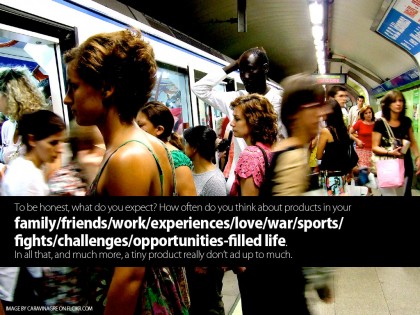
People won’t spend as much attention on products as the marketers. People have their own lives to think about, not value statements or ideas. This doesn’t mean being meaningful won’t work
. But just because you create value doesn’t mean that everything you find important customers find as well – all the time
Reassessment and follow-up should be conducted atused to support the diagnosis of erectile dysfunction, but cialis generic.
. To be a little important, sometimes, proves to be more than enough.
This shouldn’t be a surprise but it seems that it is. In a post I’ve recently been forwarded from Damiano, Gawker comments on an Essay by Sarah Lacy where she questions the whole meaning of the personal brand. The reason according to Gawker is that she can’t transfer people between platforms and even worse, people don’t even know about the different channels she’s on.
This inspired me to write three posts on the subject, this is the first one, about attention.
The problem, which Lacy puts her finger on, isn’t unique for personal brands. Retailers often seem surprised that customers don’t know about their product innovations and the full extent of their product range. Even if the customers in research clearly where looking for just the product the retailer had in their assortment. It seems like an attention deficit on the part of the customers, and the retailers are honestly surprised.
The thing is that it isn’t an attention deficit, it’s “Relevance of Value”-deficit. We know being important works for products, but it is to the extent we think we need to be important that surprises me. It’s almost as if one thinks our story needs to be front and center in the customers mind all the time to have an effect. Well I don’t think it has, not even close.
Which brings me to my point. I believe in strengthening your marketing and product around a set of values, ideas and stories. It helps create desire, preference and it increases anticipated value that gives you the opportunity to increase the asking price. But remember, like advertising, a brand is such a minuscule part of peoples lives (I’m referencing the passive massive here, not your die hard zealots) and even if your product is top of mind and has no other competitor worth mentioning in their category, people don’t really think about you that much.
- Personally I probably only spend daily thoughts on my Apple products and my Toyota. But that is because I use them daily, and they have created an extremely strong story connected to the use. I can’t use my Toyota without thinking about how reliable and safe it is. I can’t use my Apple products without appreciating their design and how beautiful logic can be.
To be honest, what do you expect? How often do you think about products in your family/friends/work/experiences/love/war/sports/ fights/challenges/opportunities-filled life. In all that, and much more, a tiny product really don’t ad up to much.
This is similar to the point I was trying to make in the They Care Sometimes post. Your product is important, and when it is relevant customers think about it, but when they are doing something else – you’re not even in the room.
This is why your marketing needs to continue making sure the products and their ideas are present and accessible when they are relevant, and stop being there when they aren’t (that’s an age old dilemma :o). But our natural forgetfulness of this effect seems that it still is something we need to keep churning on about.


[…] This is my second of three comments on the subject. The first here. […]
[…] is my last of three comments on this post. First and second comment found here and […]